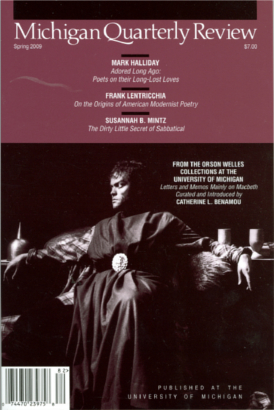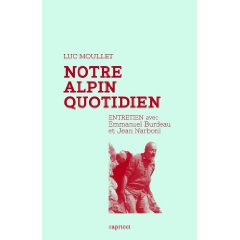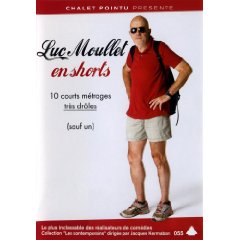 \
\
Alas, the fact that you can’t access the Spring 2009 issue of Michigan Quarterly Review online means that a good many people, including other Welles fanatics, won’t bother to hunt it down in bookstores or order it online. But this is a pity, because “Treasures from the Special Collections Library at the University of Michigan: Letters and Memos Mainly on Macbeth,” compiled and introduced by Catherine L. Benamou, is an important step forward in Welles studies. The two massive collections of “written, illustrated, recorded, and photographic materials pertaining to the writer-actor-director’s artistic career from around 1931 to 1985,” “totaling some one hundred linear feet,” have been in place for about five years now, even though they’re still being catalogued, and I’m proud to say I was the very first “outside” scholar who paid them a visit when I selected the photographs used on the cover of my most recent book, Discovering Orson Welles (University of California Press, 2007).
These two collections consist of the Welles-related papers of (a) Richard Wilson, associate producer of Mercury Theatre projects starting with Too Much Johnson in 1938 and continuing until Wilson became a film director in his own right in the 1950s, and (b) Oja Kodar, Welles’ companion, muse, and major collaborator over the last two decades of his life and career, a sculptress who worked on his films in multiple capacities (though chiefly as writer and actress). Read more



This is plainly a bumper season for Luc Moullet, who recently had an exhaustive retrospective in Paris, the release of a DVD featuring ten of his best shorts (some of which might be considered his best films), and the publication of no less than three books by him: a book-length interview with Emmanuel Burdeau et Jean Narboni (130 pages) and a long-overdue collection of his film criticism (372 pages), both published by Capricci (who were kind enough to send me copies), and a study of King Vidor’s The Fountainhead (Le Rebelle de King Vidor: les arêtes vives) published by Yellow Now that I haven’t ordered because the cost of postage from French Amazon and FNAC virtually doubles the 11,88-Euro price.
By luck, the two Capricci books and Luc Moullet en shorts (which I did pay for, postage and all) both arrived in today’s mail, and in some ways the real jewel in the bunch — or at least the item I’ve been spending the most time with so far — is the collection, Pige Choisies (De Griffith à Ellroy), which interestingly enough uses the titles of two of his best shorts, Essai d’Ouverture and Le ventre de l’Amérique, in his Table of Contents. Read more

American lynch mobs never die; they only become more self-righteous about their savagery. [9/28/09]
Postscript: Some readers of the above have asked me for some elaboration. By way of partial explanation, I can offer both an op-ed article by Robert Harris in the New York Times and my own briefer statement for the Times‘ Room for Debate blog. And, to quote myself again, from Richard Roeper’s blog: “I’m not claiming that artists deserve any special privileges of any kind. But if Polanski wasn’t famous, he wouldn’t have been arrested in Switzerland in the first place. The only reason why anyone’s writing about him now is because he’s famous. Focusing on a crime 30-odd years ago, however reprehensible, when so many other and bigger and more recent crimes are around and relevant (and unpunished) sounds to me like hysteria/exploitation/journalism/sensationalism/ entertainment — anything but impartial justice.” [10/2/09] Read more

 \
\


